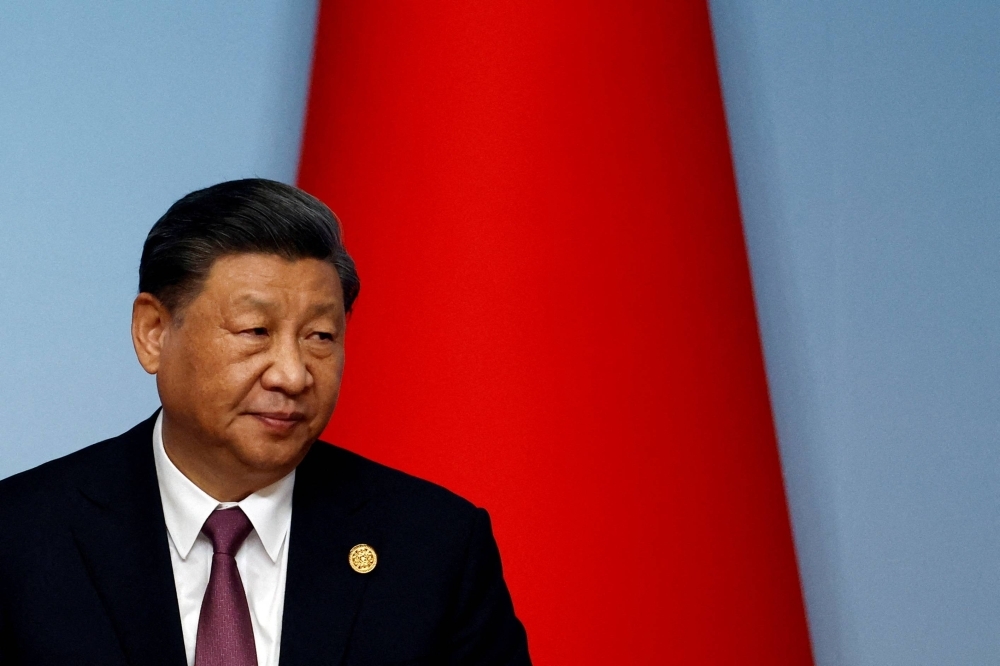Two days is all Chinese leader Xi Jinping has spent outside his country this year, as mounting domestic problems from a faltering economy to rare political scandals demand his attention at home.
Xi’s border hop to visit Russian President Vladimir Putin in March has been his sole trip abroad, representing the shortest amount of time he’s spent overseas in the first half of a year since taking power, excluding the pandemic.
That’s a major shift from his pre-COVID schedule, when Xi traveled more often and for longer than his U.S. counterpart. The Chinese leader made an average of 14 overseas trips annually between 2013 and 2019, according to a Bloomberg News analysis of government readouts of Xi’s diplomatic meetings.
By comparison, U.S. President Donald Trump averaged 12 during his time in office, according to data compiled by the Eurasia Group.
Now, Xi is making foreign dignitaries come to him. He’s met representatives from 36 nations including France, Eritrea and the U.S. in Beijing so far this year. Before the pandemic, Xi hosted an average of 48 dignitaries annually in the same period, meaning his overall in-person dialogue is in decline.
And, unlike in the pandemic, he’s not supplementing meetings with video calls: The Chinese leader has had just one this year with the Czech Republic.
His reduction in face-time with global leaders could handicap Beijing’s ability to compete with Washington for global influence. That comes at a time when international perceptions of China are souring over its foreign policy, according to a survey released last month by the Pew Research Center.
Wen-Ti Sung, nonresident fellow at the Washington-based Atlantic Council’s Global China Hub, said it could be that Xi has more pressing priorities right now than diplomacy. China’s economy is fending off deflation, his protege Foreign Minister Qin Gang has been removed and he’s ousted top leaders of the nation’s nuclear missile force amid rumors of a corruption probe.
“China simply has more urgent domestic priorities,” said Sung, noting that Xi’s centralization of power means his presence is increasingly required to deal with such problems. “As the opportunity cost of his absence rises, Xi will naturally become even more selective about going on extended visits abroad and he will go abroad less frequently.”
Xi was expected to resume a busy global schedule once pandemic controls that kept him inside China for nearly 1,000 days — the longest COVID isolation of any Group of 20 leader — were lifted at the beginning of this year.
By the end of 2022, he’d already started traveling to countries, including Uzbekistan, Indonesia and Saudi Arabia, even though China’s borders remained closed. Since then, however, he’s barely set foot outside his nation.
Scheduling could be partly to blame. Indian Prime Minister Narendra Modi hosted a two-day Shanghai Cooperation Organization meeting by video in July, whereas last year’s summit saw Xi travel to Kazakhstan — his first trip outside China since January 2020.
Other major international summits, such as the G20 and Asia-Pacific Economic Cooperation, fall in the second half of this year.
The Chinese leader is expected to attend a summit of emerging economy leaders in Johannesburg this month. While Putin will participate in that event virtually, to excuse South Africa from having to execute an International Criminal Court arrest warrant for him, Modi has confirmed his in-person presence.
The White House’s reported plan to blacklist Hong Kong’s John Lee from the APEC leaders’ summit in San Francisco this November, however, could deter Xi from attending. Lee is sanctioned for his role in diminishing Hong Kong’s autonomy under a security law imposed by Xi. The Chinese leader’s absence would remove an opportunity for his first state visit to the U.S. since Joe Biden became president in 2021.
China’s worsening global image has made it harder for democratic leaders to host Xi, according to Neil Thomas, a fellow for Chinese politics at Asia Society Policy Institute’s Center for China Analysis. Xi’s handling of the pandemic, alleged human rights abuses in Xinjiang and refusal to condemn Putin’s war in Ukraine have all damaged ties with the West.
“Elected leaders in the West are more likely to attract criticism than win praise for meeting with Xi,” he added. “It’s bad politically to meet with Xi.”
Before the pandemic, European guests accounted for at least 14% of Xi’s annual visiting delegations, hitting 20% in 2019. This year, that figure is at just 8%.
British Prime Minister Rishi Sunak is highly unlikely to travel to China before the U.K.’s next general election, Bloomberg News reported in June, as he faces increasingly skeptical views of China at home.
Xi’s next major opportunity to host a group of world leaders will come in October at the Belt and Road initiative summit. That event attracted nearly 39 heads of states in 2019, 10 more than the first summit in 2017.
But it’s still unclear who will attend. European nations including France, Germany, Greece and the Czech Republic plan to the forum, the Wall Street Journal reported last week. Italy, the only Group of Seven nation to have signed on to the pact, is planning to exit the controversial agreement.
While Xi called for “meticulous efforts” to prepare for the forum last month, he’s unlikely to pay too much attention to the guest list.
“The priority of his third term is security and securing his ruling internally,” said Alfred Wu, an associate professor at the Lee Kuan Yew School of Public Policy in Singapore. “Xi’s probably quite confident about his status as world No. 2, so he’d expect others to come to China to visit him.”

